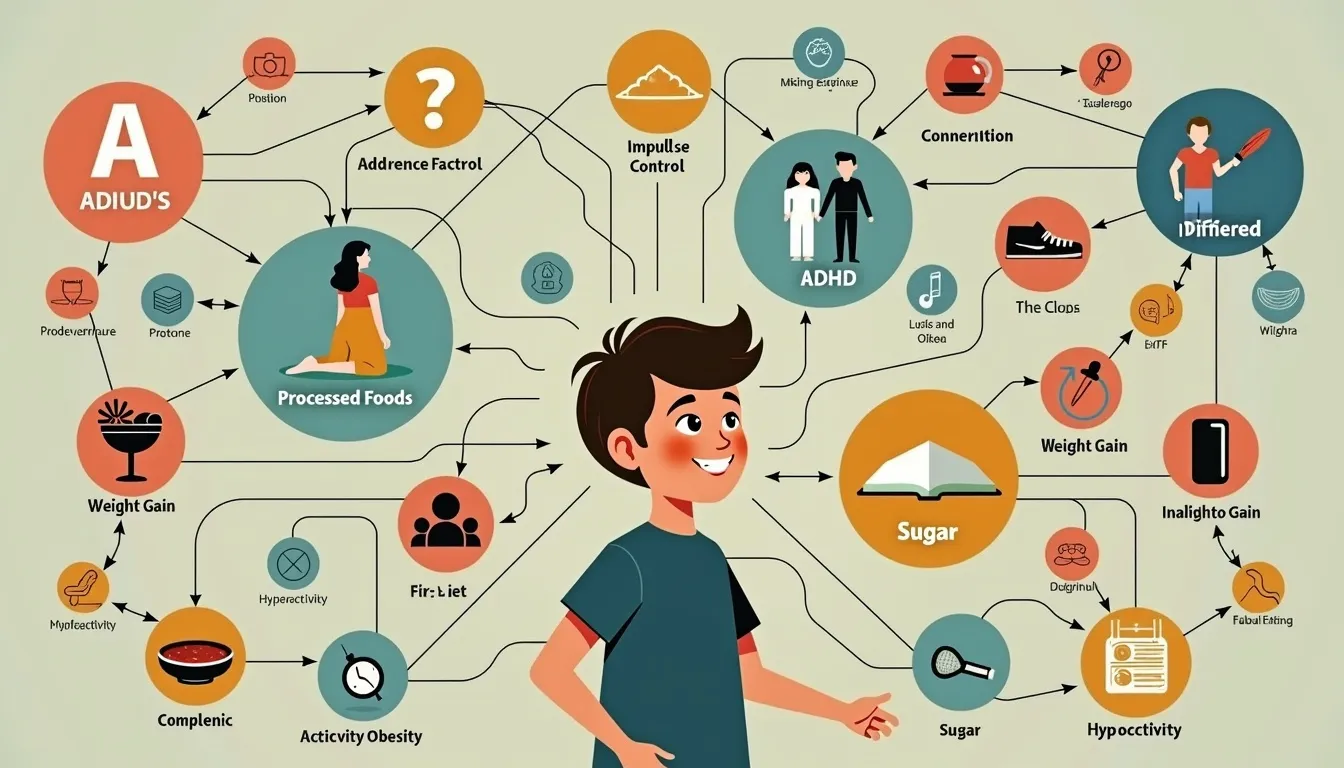Balanced Diet for ADHD Management - ADHD, Obesity, and the U.S. Nutritional System: Why It's Time to Go Against the Grain for Your Child's Health

As parents, we’re constantly looking for ways to support our children’s growth, health, and development. For those raising a child with ADHD, that journey can feel even more challenging, especially when it comes to managing their focus, behavior, and energy levels. But there’s a problem that doesn’t get nearly enough attention: the U.S. nutritional system. A balanced diet for ADHD management can make a significant difference, yet the standard American diet may be holding your child back. For more insights on managing ADHD symptoms effectively, consider exploring our guide on Understanding and Managing ADHD Symptoms with Bonding Health.
The truth is, whether your child has ADHD or not, following the standard U.S. diet makes it almost impossible for them to concentrate. The link between poor nutrition, ADHD, and childhood obesity is becoming more evident, and it’s clear that the system we’re trusting to nourish our children is broken. It’s time for parents to take a contrarian approach to diet—because if we don’t, we’re not giving our kids a fair chance at success, focus, or even maintaining a healthy weight.
The Link Between ADHD, Obesity, and Diet

Let’s start with the connection between ADHD and obesity. Studies show that children with ADHD are more likely to struggle with weight management, and it’s not hard to see why. ADHD impacts impulse control, which makes it harder for children to make healthy food choices. Combine that with a diet filled with processed foods, sugar, and additives—exactly what the U.S. nutritional system pushes—and you’ve got a recipe for both behavioral issues and weight gain. For more on managing weight in individuals with ADHD, check out Effective Weight Loss Strategies for Individuals with ADHD.
But the issue isn’t just limited to ADHD kids. The processed, sugary, and additive-filled diet that the U.S. promotes is affecting all children. Even those without ADHD are experiencing difficulty concentrating in school, increased hyperactivity, and a higher risk of obesity. The food our kids are consuming is affecting their ability to focus, think clearly, and maintain healthy energy levels throughout the day.
The U.S. Nutritional System Is Failing Our Children
When you take a closer look at the standard American diet, it’s no wonder that children are struggling. The typical school lunch is often packed with ultra-processed foods, sugar-laden snacks, and very little in the way of actual nutrition. Fast food, sugary drinks, and pre-packaged snacks have become the norm in many households because they’re convenient and cheap—but these foods are robbing our children of the nutrients they need to thrive, especially those with ADHD. As an alternative, consider providing nutrient-rich snacks such as those found in our guide on Smoothie for ADHD, which can help improve focus and energy levels.
Why It’s Time to Take a Contrarian Approach

So what can parents do? The solution lies in rejecting the mainstream nutritional advice and adopting a contrarian approach to diet. This means stepping away from the processed foods, sugars, and additives that dominate the shelves and turning toward a more whole-food-based, nutrient-dense way of eating. A balanced diet for ADHD management can lead to steadier focus, better behavior, and improved overall health. For example, incorporating healthy fats is crucial, and you can learn more about their benefits in our article on The Role of Omega-3 Fatty Acids in ADHD Management.
Practical Tips for Parents: How to Shift to a Balanced Diet
-
Start Small, Replace Gradually: Begin by gradually replacing processed snacks with whole-food alternatives. Swap sugary cereals for oatmeal, chips for nuts, and soda for water infused with fruit. Over time, these small changes add up.
-
Prioritize Whole Foods: When grocery shopping, focus on the perimeter of the store where fresh produce, lean meats, and whole grains are located. Avoid the center aisles filled with processed and packaged foods. Prioritize fresh vegetables, fruits, lean proteins, and healthy fats.
-
Involve Your Child: Let your child be part of the process. Teach them about the importance of healthy eating and how it impacts their brain and body. Involving them in meal prep and grocery shopping can help them feel more invested in their health. For additional tools to help manage ADHD symptoms, you might find our guide on the Top 7 ADHD Apps for Kids useful.
-
Seek Support: Transitioning to a balanced diet for ADHD management isn’t always easy, but there are numerous resources available. Seek support from nutritionists, ADHD specialists, and online communities dedicated to whole-food nutrition for ADHD management. Additionally, using resources like the ADHD Child Parent Self-Monitoring Checklist Guide can help track progress and make the transition smoother.
Conclusion: Rejecting the Standard for Your Child’s Future
The U.S. nutritional system may continue to push processed, sugary, and nutrient-devoid foods, but that doesn’t mean we have to follow suit. As parents, we have the power to reject the status quo and take a contrarian approach to our children’s diets. This shift isn’t just about preventing obesity or managing ADHD—it’s about giving your child the best possible chance to thrive, both mentally and physically.
By making mindful changes to what your child eats, you’re setting them up for better focus, improved behavior, and long-term health. It’s time to deviate from the system and take control of what goes into their bodies—because their future depends on it. Combining a balanced diet with regular physical activity can make a substantial difference, as explained in our article on Boosting ADHD Management Through Physical Activity.

